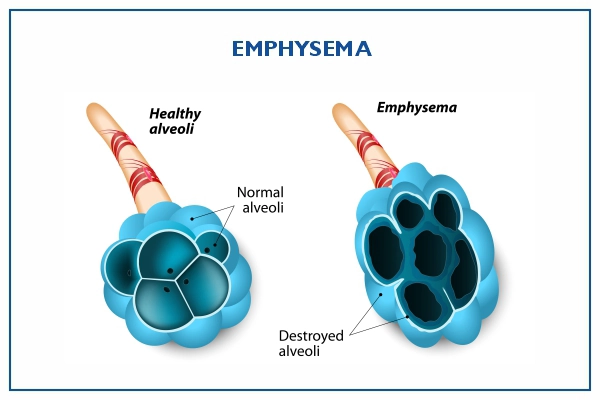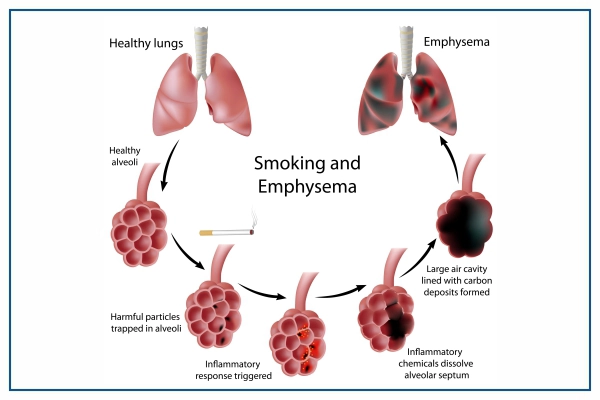Emphysema: Symptoms, Causes, Diagnosis, and Treatment
Written by Medicover Team and Medically Reviewed by Dr G L Sushmitha Reddy , Pulmonologist
Emphysema is a chronic lung disease that damages the alveoli, the tiny air sacs in the lungs. It reduces oxygen exchange and impairs breathing, particularly during physical activity.
This irreversible condition is commonly linked to smoking and falls under Chronic Obstructive Pulmonary Disease (COPD).
Managing emphysema early can help prevent complications and improve long-term quality of life for patients. Timely medical attention and lifestyle changes play a vital role in managing symptoms and preserving lung function.
What are the Symptoms and Warning Signs of Emphysema?
Recognizing emphysema early helps slow its progression. Symptoms vary among individuals and can resemble those of other respiratory conditions. Consult a doctor for an accurate diagnosis. Shortness of breath is usually the first symptom and gradually worsens over time. As the condition progresses, more serious symptoms develop, affecting daily activities and overall health. Awareness of early signs can lead to quicker diagnosis and better management.
Common Symptoms
- Shortness of breath (especially during physical activity)
- Cough and wheezing
- Sputum production
- Rapid breathing
Severe Symptoms
- Swelling in the legs and feet
- Fatigue and sleep problems
- Anxiety and depression
- Over-inflated chest
- Weight loss
- Heart complications

What are the Different Types of Emphysema?
Emphysema can be categorized based on the areas of the lungs affected. Knowing the type can help guide treatment plans and expectations. Different types affect different regions of the lungs and may result from various causes, including smoking or genetic disorders. Understanding these types enables physicians to offer individual treatment and provide more accurate prognostic advice.
Centrilobular Emphysema (CLE)
It primarily affects the upper lobes of the lungs and is commonly observed in individuals who smoke.
Panlobular Emphysema (PLE)
Affects all areas of the lungs evenly, often linked with alpha-1 antitrypsin deficiency.
Paraseptal Emphysema
Targets the outer parts of the lungs and may increase the risk of lung collapse.
What are the Common Causes and Risk Factors of Emphysema?
Understanding the causes of emphysema and identifying who is at risk can support prevention and early treatment. Smoking is the leading cause, but exposure to environmental and occupational irritants also plays a role. Identifying risk factors enables individuals to take preventive actions, such as quitting smoking and avoiding air pollutants.
Causes
- Long-term cigarette smoking
- Workplace exposure to dust and chemical fumes
- Air pollution
- Alpha-1 antitrypsin deficiency (a rare genetic cause)
Risk Factors
- Age over 40
- Long-term exposure to secondhand smoke
- Breathing in indoor and outdoor pollutants
- Family history of COPD
Get a second opinion from trusted experts and makeconfident, informed decisions.
Get Second OpinionHow is Emphysema Diagnosed?
Accurate diagnosis of emphysema requires clinical history and a series of diagnostic tests to assess lung function and identify damage. This helps tailor a individual care plan.
Early diagnosis improves the chances of slowing disease progression and managing symptoms effectively. Medicover offers complete lung testing supported by advanced diagnostic tools and trained respiratory specialists.
Diagnostic Methods
- Chest X-rays and CT scans
- Pulmonary function tests (PFTs)
- Pulse oximetry
- Arterial blood gas analysis
- Blood tests to evaluate oxygen transport
- Electrocardiogram (ECG) to assess heart function.
Medicover offers advanced imaging and lung function testing using latest diagnostic technology.
What are the Treatment Options for Emphysema?
Although emphysema cannot be cured, treatments can manage symptoms and improve quality of life. Early and individual care is crucial for controlling progression. Medicover provides evidence-based medical and surgical options prepared to each patient's condition severity and lifestyle, helping them breathe easier and stay active longer.
Lifestyle Changes
- Quitting smoking is crucial.
- Avoiding lung irritants
- Regular exercise under medical supervision
Medications
- Bronchodilators to relax airways
- Anti-inflammatory drugs to reduce lung swelling
- Oxygen therapy for low blood oxygen levels
Surgical Options
- Lung volume reduction surgery (LVRS)
- Lung transplant in severe cases
Medicover's pulmonologists customize treatment plans based on disease severity and patient needs.
When Should You See a Doctor for Emphysema?
It is essential to consult a doctor if you experience persistent breathing difficulties, even during mild physical activity. Early medical intervention leads to better outcomes. Don't wait until symptoms disrupt your daily routine. Getting checked early can improve your prognosis and delay disease progression.
- Experience shortness of breath that limits daily activities
- Notice chronic cough or wheezing
- Have sudden weight loss or fatigue.

Your health is everything - prioritize your well-being today.
What is the Recovery Process After Emphysema Treatment?
Emphysema requires lifelong management. While damage cannot be reversed, symptom relief and prevention of progression are possible through consistent care and support.
Recovery involves regular medical follow-ups, adherence to treatment, and changes to lifestyle. Medicover ensures that each patient receives a individual plan for better breathing and improved energy levels.
Post-Treatment Care
- Routine follow-ups with a pulmonologist
- Pulmonary rehabilitation programs
- individual exercise and diet plans
Medicover offers complete post-treatment support, including rehabilitation and nutritional guidance, to promote long-term health.
What Precautions Can Help Prevent Emphysema?
Adopting healthy habits and avoiding irritants can reduce the risk of emphysema and its complications. Preventive care can delay the onset of severe symptoms.
Taking steps such as quitting smoking, using air filters, and staying active helps maintain lung health. Prevention is essential for individuals with a family history or those who experience early respiratory symptoms.
Prevention Tips
- Avoid smoking and secondhand smoke.
- Minimize exposure to chemical fumes and pollutants
- Use protective equipment at work
- Stay physically active
Possible Complications
- Pneumonia
- Pneumothorax (collapsed lung)
- Respiratory failure
- Hypoxemia and respiratory acidosis
Our Experience Treating Emphysema
At Medicover Hospitals, our experienced pulmonology team provides compassionate care for patients with emphysema. Using advanced diagnostic tools and evidence-based treatments.
We offer individual care plans that focus on improving breathing, preventing complications, and enhancing overall well-being through expert support. Patients receive continuous monitoring, emotional support, and education about managing their condition.
Lifestyle Tips and Self-Care
Managing emphysema involves proactive steps beyond medication. Making small daily adjustments helps reduce flare-ups and maintain better lung function.
Self-care routines include avoiding respiratory irritants, managing stress effectively, and adhering to your treatment regimen. Support from family and health professionals also plays a vital role in maintaining stability and quality of life.
- Avoid cold air exposure
- Keep indoor air clean
- Use masks when needed
- Stay up to date on flu and pneumonia vaccines
- Prevent respiratory infections by avoiding crowded places
Dos and Don'ts
| Dos | Don'ts |
| Maintain a healthy weight | Smoke or use tobacco products |
| Exercise regularly | Ignore worsening symptoms |
| Monitor symptoms closely | Skip medications |
| Use inhalers as prescribed | Delay doctor visits |
| Follow up with your doctor | Self-medicate without guidance |
